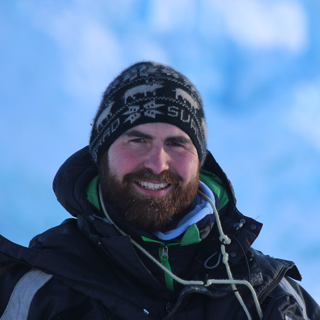How did you get to where you are today?
Before coming to Exeter, I gained a first class B.Sc Geography degree at the University of Sheffield (2004-2007) and then went on to research for a PhD at Swansea University titled ‘Controls on the calving rate of North-West Svalbard glaciers’.
As a glaciologist I have field experience in Greenland, Svalbard and Iceland and am passionate about teaching and the use of GIS to understand spatial data, patterns and trends. I gained Senior Fellowship from the Higher Education Academy in 2017 and have also won awards for my work creating web mapping apps.
Now I'm a Senior Lecturer specialising in glaciology, remote sensing and Geographical Information Systems (GIS) and am Programme Director for a degree pathway that I successfully proposed for approval: Geography with Applied GIS.
Was there anything particularly useful that helped you get this role?
After completing my PhD I was employed as an Associate Lecturer at The University of Exeter. What really helped me get this role was the teaching that I did during my PhD. In the geography department at Swansea I was paid an hourly rate to contribute to existing modules and courses. Although they were all geography modules, the subjects were sometimes outside of my expertise and I quickly realised that successful teaching was about encouraging students to be able to apply the skills that I was teaching to their own work, project or future job/role.
What do you do as part of your job?
My current role as Senior Lecturer involves work focussing on education design, delivery and support. I design teaching resources and teach them to undergraduate students. Much of this involves teaching students GIS skills to understand spatial data such as GPS recordings, satellite images, maps or drone photography. By combining datasets and applying spatial analysis patterns and trends, insights can be gained from the data that can be applied to all sorts of sectors from research business, government, education, entertainment and leisure.
One of the resources that I am currently developing is an immersive environment computer game style virtual fieldtrip tool, which allows educators and learners to explore virtual environments. Find out more.
My background is in glaciology, so most years I have been away on fieldtrips in the Arctic Circle. Fieldwork has involved research from a boat in a Greenland Fjord surrounded by icebergs, measuring snow properties on glaciers in Svalbard from the back of snow-mobiles or taking students out into the field to teach them about climate change and the impact on Iceland and Svalbard ice-caps.
What do you enjoy most about your job?
When I get asked this question, I often find myself answering with my most recent project, since I love the evolving nature of my job. I have recently just finished teaching a new course called GIS for Professionals. This work involved teaching students how to apply their skills to the workplace. For the first assessment I set them the task of producing an interactive sustainability map and web-app of campus. The outputs generated amazed me and so it is such a rewarding job seeing students apply their skills so effectively and enthusiastically.
What advice would you give to someone wanting to go into this career?
Try to identify what you are passionate about and then try to identify how you can bring originality to the field. What can you do differently, what questions do you want to discover, what techniques can you evolve?
Why did you choose geography? Why should others choose geography?
Everything must happen somewhere and in geography we can better understand this by understanding the interactions of what is happening in both space and place. Complexity in geography can be explored in multi-dimensions from evolving timescales, spatial scales and even spectrally by using scientific tools to explore landscapes beyond the visible light we see with our eyes and into, for example, the infrared to understand patterns and trends.
Jobs in this role can attract salaries of between £32,000 - £47,999.
* This interview was undertaken in 2019 and was correct at the time of publication. Please note that the featured individual may no longer be in role, but the profile has been kept for career pathway and informational purposes.


